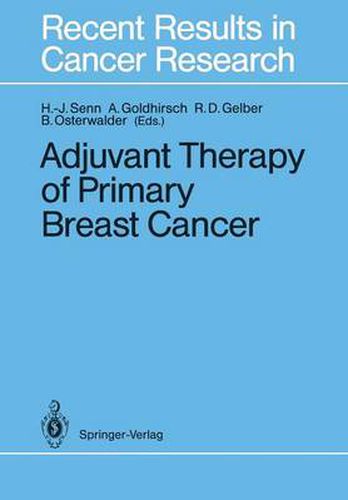Readings Newsletter
Become a Readings Member to make your shopping experience even easier.
Sign in or sign up for free!
You’re not far away from qualifying for FREE standard shipping within Australia
You’ve qualified for FREE standard shipping within Australia
The cart is loading…






This title is printed to order. This book may have been self-published. If so, we cannot guarantee the quality of the content. In the main most books will have gone through the editing process however some may not. We therefore suggest that you be aware of this before ordering this book. If in doubt check either the author or publisher’s details as we are unable to accept any returns unless they are faulty. Please contact us if you have any questions.
The ultimate consumer of the data presented at conferences on the primary treatment of operable breast cancer is the patient, and when, as in this disease, the benefits of therapy are relatively mod est, the availability and interpretation of the data from trials be comes an issue of primary importance. The effects of present treat ment are in fact such that more patients relapse despite therapy than are estimated to benefit from it. It is, therefore, extremely dif ficult for the physician to recommend unequivocally one particular adjuvant treatment modality for the vast population of women with breast cancer. The interpretation of results from clinical research-oriented pro grams is constantly applied, however, in the treatment of breast cancer patients outside of clinical trials. From presented or publish ed data, many physicians extrapolate indications for the use of a given treatment regimen for their patients, perceiving it as the best available therapy.
It is essential that the best available therapy be selected individually for each patient. However, considering the modest effect of treatment upon outcome, it is imperative that those who provide the data - those who are involved in both pa tient care and clinical research - make it known that the best cur rent treatment for the population of breast cancer patients is avail able within the framework of clinical trials. In this way not only present-day patients but also future ones will derive the greatest benefit.
$9.00 standard shipping within Australia
FREE standard shipping within Australia for orders over $100.00
Express & International shipping calculated at checkout
This title is printed to order. This book may have been self-published. If so, we cannot guarantee the quality of the content. In the main most books will have gone through the editing process however some may not. We therefore suggest that you be aware of this before ordering this book. If in doubt check either the author or publisher’s details as we are unable to accept any returns unless they are faulty. Please contact us if you have any questions.
The ultimate consumer of the data presented at conferences on the primary treatment of operable breast cancer is the patient, and when, as in this disease, the benefits of therapy are relatively mod est, the availability and interpretation of the data from trials be comes an issue of primary importance. The effects of present treat ment are in fact such that more patients relapse despite therapy than are estimated to benefit from it. It is, therefore, extremely dif ficult for the physician to recommend unequivocally one particular adjuvant treatment modality for the vast population of women with breast cancer. The interpretation of results from clinical research-oriented pro grams is constantly applied, however, in the treatment of breast cancer patients outside of clinical trials. From presented or publish ed data, many physicians extrapolate indications for the use of a given treatment regimen for their patients, perceiving it as the best available therapy.
It is essential that the best available therapy be selected individually for each patient. However, considering the modest effect of treatment upon outcome, it is imperative that those who provide the data - those who are involved in both pa tient care and clinical research - make it known that the best cur rent treatment for the population of breast cancer patients is avail able within the framework of clinical trials. In this way not only present-day patients but also future ones will derive the greatest benefit.